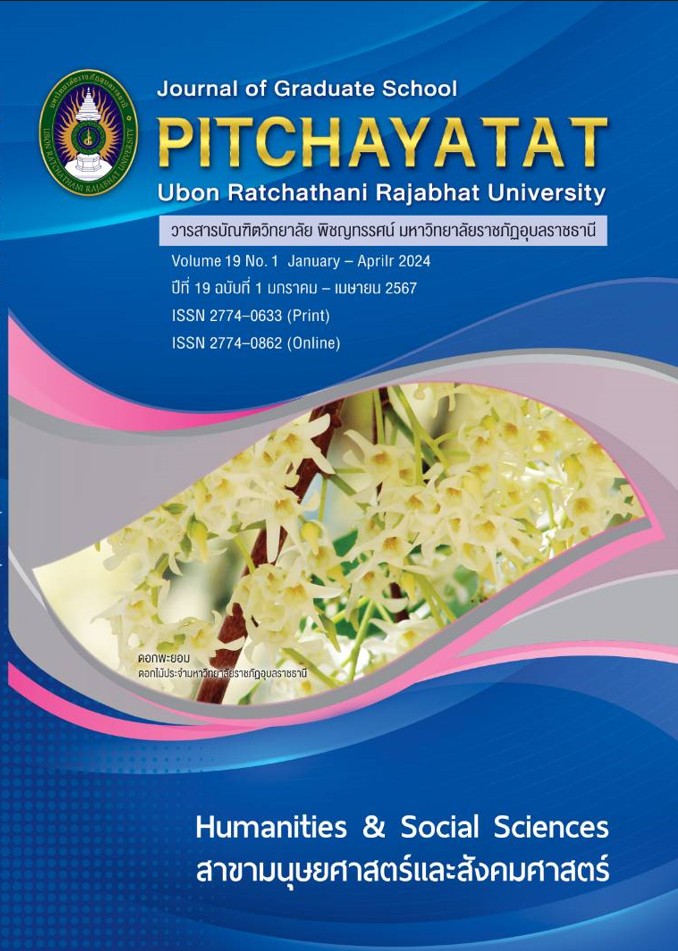ผลการจัดการเรียนรู้โดยใช้ปัญหาเป็นฐานร่วมกับแนวคิดห้องเรียนกลับด้าน และเกมิฟิเคชัน ที่มีต่อทักษะการคิดเชิงคำนวณ และความสามารถในการเขียนโปรแกรม ของนักเรียน ระดับชั้นมัธยมศึกษาปีที่ 1 ด้วยแบบแผนการทดลองแบบสี่กลุ่มของโซโลมอน
คำสำคัญ:
ปัญหาเป็นฐาน , แนวคิดห้องเรียนกลับด้าน , เกมิฟิเคชัน , ทักษะการคิดเชิงคำนวณ , ความสามารถในการ เขียนโปรแกรม, แบบแผนการทดลองสี่กลุ่มของโซโลมอนบทคัดย่อ
การวิจัยนี้มีวัตถุประสงค์เพื่อ 1) ศึกษาปฏิสัมพันธ์ระหว่างวิธีการจัดการเรียนรู้และการวัดผลก่อนเรียนที่มีต่อทักษะการคิดเชิงคำนวณและความสามารถในการเขียนโปรแกรมของนักเรียน และ 2) เปรียบเทียบผลการจัดการเรียนรู้โดยใช้ปัญหาเป็นฐานร่วมกับแนวคิดห้องเรียนกลับด้าน และเกมิฟิเคชัน กับการจัดการเรียนรู้โดยใช้ปัญหาเป็นฐานแบบปกติ ของนักเรียนระดับชั้นมัธยมศึกษาปีที่ 1 ที่มีต่อทักษะการคิดเชิงคำนวณและความสามารถในการเขียนโปรแกรมของนักเรียน ด้วยแบบแผนการทดลองแบบสี่กลุ่มของโซโลมอน ตัวอย่างที่ใช้ในการวิจัยคือ นักเรียนชั้นมัธยมศึกษาปีที่ 1 จำนวน 140 คน โดยใช้การสุ่มแบบแบ่งกลุ่ม แบ่งเป็นกลุ่มทดลอง 2 กลุ่ม และกลุ่มควบคุม 2 กลุ่ม กลุ่มละ 35 คน เครื่องมือที่ใช้ ได้แก่ 1) แผนการจัดการเรียนรู้โดยใช้ปัญหาเป็นฐานร่วมกับแนวคิดห้องเรียนกลับด้าน และเกมิฟิเคชัน 2) แผนการจัดการเรียนรู้โดยใช้ปัญหาเป็นฐานแบบปกติ 3) แบบวัดทักษะการคิดเชิงคำนวณ 4) แบบวัดความสามารถในการเขียนโปรแกรม สถิติที่ใช้ ได้แก่ 1) สถิติบรรยาย ได้แก่ ค่าเฉลี่ย และส่วนเบี่ยงเบนมาตรฐาน 2) สถิติที่ใช้ในการทดสอบสมมติฐาน ได้แก่ การวิเคราะห์ความแปรปรวนพหุนามแบบสองทาง และการวิเคราะห์ความแปรปรวน
ผลการวิจัยพบว่า
- อิทธิพลปฏิสัมพันธ์ระหว่างวิธีการจัดการเรียนรู้และการวัดผลก่อนเรียน ส่งผลต่อทักษะการคิดเชิงคำนวณ และความสามารถในการเขียนโปรแกรม อย่างมีนัยสำคัญทางสถิติที่ระดับ .05
- คะแนนเฉลี่ยทักษะการคิดเชิงคำนวณ และความสามารถในการเขียนโปรแกรมหลังเรียนของนักเรียนกลุ่มทดลอง และนักเรียนกลุ่มควบคุมทั้ง 4 กลุ่ม แตกต่างกัน อย่างมีนัยสำคัญทางสถิติที่ระดับ .05
เอกสารอ้างอิง
จิตรลดา วิวัฒน์เจริญวงศ์. ผลของการใช้เทคนิคการทดสอบย่อยที่มีต่อผลสัมฤทธิ์ทางการเรียนของนักศึกษาในรายวิชา ACT314 การบัญชีบริหาร สาขาวิชาการบัญชี คณะบัญชี มหาวิทยาลัยศรีปทุม. (ออนไลน์) 2555 (อ้างเมื่อ 22 มกราคม 2565). จาก http://www.dspace.spu.ac.th/handle/ HYPERLINK "http://www.dspace.spu.ac.th/handle/123456789/5056"123456789/5056
เจนจิรา เกียรติสินทรัพย์ สาริณี โต๊ะทอง และทานตะวัน แย้มบุญเรือง. “ผลการใช้การปรึกษาเชิงจิตวิทยาแนวซาเทียร์แบบกลุ่ม และแบบรายบุคคลต่อความสามารถจัดการความเครียดของนักศึกษาพยาบาล,” วารสารวิจัยทางวิทยาศาสตร์สุขภาพ. 14, 1 (มกราคม-เมษายน 2563): 65-74.
ชนัตถ์ พูนเดช และธนิตา เลิศพรกุลรัตน์. “แนวทางการจัดการเรียนรู้ด้วยแนวคิดเกมมิฟิเคชัน,” วารสารศึกษาศาสตร์ มหาวิทยาลัยนเรศวร. 18, 3 (กรกฎาคม – กันยายน 2559): 331-339.
ชัยภัทร ลูกบัว. รูปแบบการจัดการเรียนรู้ด้วยกิจกรรม Robotics ร่วมกับการเรียนรู้โดยใช้ปัญหาเป็นฐานเพื่อส่งเสริมการคิดเชิงคำนวณ สำหรับนักเรียนระดับชั้นประถมศึกษาปีที่ 3 โรงเรียนสาธิตมหาวิทยาลัยศรีนทรวิโรฒ ประสานมิตร (ฝ่ายประถม). วิทยานิพนธ์การศึกษามหาบัณฑิต มหาวิทยาลัยศรีนครินทร วิโรฒ, 2563.
ชูศรี วงศ์รัตนะ และองอาจ นัยพัฒน์. แบบแผนการวิจัยเชิงทดลองและสถิติวิเคราะห์ แนวคิดพื้นฐานและวิธีการ. กรุงเทพฯ: สำนักพิมพ์แห่งจุฬาลงกรณ์มหาวิทยาลัย, 2551.
โชคติกา สงคราม. การวิจัยเชิงปฏิบัติการเพื่อพัฒนาการจัดการเรียนรู้แบบใช้ปัญหาเป็นฐานที่ส่งเสริมทักษะการคิดเชิงคำนวณ เรื่อง ความน่าจะเป็น ของนักเรียนชั้นมัธยมศึกษาปีที่ 4. วิทยานิพนธ์การศึกษามหาบัณฑิตมหาวิทยาลัยนเรศวร, 2562.
ณัฐธิดา กัลยาประสิทธิ์. การพัฒนาการคิดเชิงคำนวณโดยใช้การจัดการเรียนรู้แบบปัญหาเป็นฐานตามแนวคิดสะเต็มศึกษา เรื่องโมเมนตัมและการชน สำหรับนักเรียนชั้นมัธยมศึกษาปีที่ 4. วิทยานิพนธ์การศึกษามหาบัณฑิต มหาวิทยาลัยนเรศวร, 2564.
นครินทร์ สุกใส. ผลการจัดการเรียนการสอนโดยใช้ห้องเรียนกลับด้านร่วมกับเกมมิฟิเคชันที่มีต่อความสามารถในการประยุกต์ความรู้ทางคอมพิวเตอร์ของนักเรียนมัธยมศึกษาตอนปลาย. วิทยานิพนธ์ครุศาสตรมหาบัณฑิต จุฬาลงกรณ์มหาวิทยาลัย, 2560.
นลิน คำแน่น. การพัฒนารูปแบบการเรียนกลับด้านร่วมกับการเรียนโดยใช้ปัญหาเป็นฐานและเกมิฟิเคชัน เพื่อส่งเสริมการคิดเชิงคำนวณและแรงจูงใจใฝ่สัมฤทธิ์ของนักเรียนมัธยมศึกษาตอนปลาย. วิทยานิพนธ์ครุศาสตรมหาบัณฑิต จุฬาลงกรณ์มหาวิทยาลัย, 2562.
ฟาริดา แวกะจิ. ปัจจัยที่มีอิทธิพลต่อผลสัมฤทธิ์ทางการเรียนคณิตศาสตร์ของนักเรียนชั้นมัธยมศึกษาปีที่ 3: การวิเคราะห์ตัวแปรส่งผ่าน. วิทยานิพนธ์ศึกษาศาสตรมหาบัณฑิต มหาวิทยาลัยสงขลานครินทร์, 2564.
เฟื่องลัดดา จิตจักร. ผลการใช้ชุดกิจกรรมการเรียนรู้โดยใช้ปัญหาเป็นฐาน เรื่องปฏิกิริยาเคมี ที่มีต่อผลสัมฤทธิ์ทางการเรียน และการแก้ปัญหาอย่างสร้างสรรค์ของนักเรียนระดับชั้นมัธยมศึกษาปีที่ 6 ด้วยแบบแผนการทดลองสี่กลุ่มของโซโลมอน. วิทยานิพนธ์การศึกษามหาบัณฑิต มหาวิทยาลัยศรีนครินทรวิโรฒ, 2558.
ยุภารัตน์ พืชสิงห์. การพัฒนาทักษะการคิดเชิงคำนวณโดยใช้การจัดกิจกรรมการเรียนรู้แบบใช้ปัญหาเป็นฐานร่วมกับเครือข่ายสังคมออนไลน์ของนักเรียนชั้นมัธยมศึกษาปีที่ 2. วิทยานิพนธ์การศึกษามหาบัณฑิต มหาวิทยาลัยมหาสารคาม, 2564.
วิจารณ์ พานิช. ครูเพื่อศิษย์ สร้างห้องเรียนกลับทาง. พิมพ์ครั้งที่ 2. กรุงเทพฯ: เอสอาร์พริ้นแมสโปรดักส์, 2556.
สุพัตรา อุตมัง. “แนวคิดห้องเรียนกลับด้าน : ภาพฝันที่เป็นจริงในวิชาภาษาไทย,” วารสารวิชาการศึกษาศาสตร์ คณะศึกษาศาสตร์มหาวิทยาลัยศรีนครินทรวิโรฒ. 16, 1 (มกราคม-มิถุนายน 2558): 51-58.
อาจณรงค์ มโนสุทธิฤทธิ์ และมนตรี แย้มกสิกร. “การพัฒนาระบบการสอนเพื่อพัฒนาความสามารถในการเขียนโปรแกรมคอมพิวเตอร์สำหรับนักเรียนระดับชั้นมัธยมศึกษาตอนต้น,” วารสารศิลปากรศึกษาศาสตร์วิจัย. 5, 2 (กรกฎาคม-ธันวาคม 2556): 274-275.
Bergmann, jonathan and Aaron Sams. Flipped Your Classroom Reach Every Student in Every Class Every Day. The United States of America: International Society for Technology in Education, 2012.
Faul, F. et al. "G*Power 3: A flexible statistical power analysis program for the social, behavioral, and biomedical sciences," Behavior Research Methods. 39 (2007): 175-191.
Kapp, Karl M. The gamification of learning and instruction: game-based methods and strategies for training and education. The United States of America: John Wiley & Sons, 2012.
ดาวน์โหลด
เผยแพร่แล้ว
รูปแบบการอ้างอิง
ฉบับ
ประเภทบทความ
สัญญาอนุญาต
ลิขสิทธิ์ (c) 2024 วารสารบัณฑิตวิทยาลัย พิชญทรรศน์ มหาวิทยาลัยราชภัฏอุบลราชธานี

อนุญาตภายใต้เงื่อนไข Creative Commons Attribution-NonCommercial-NoDerivatives 4.0 International License.
บทความทุกเรื่องได้รับการตรวจความถูกต้องทางวิชาการโดยผู้ทรงคุณวุฒิภายนอกอย่างน้อย 3 คน ความคิดเห็นในวารสารพิชญทรรศน์เป็นความคิดเห็นของผู้นิพนธ์มิใช่ความคิดเห็นของผู้จัดทำ จึงมิใช่ความรับผิดชอบของวารสารพิชญทรรศน์ และบทความในวารสารพิชญทรรศน์สงวนสิทธิ์ตามกฎหมายไทย การจะนำไปเผยแพร่ต้องได้รับอนุญาตเป็นลายลักษณ์อักษรจากกองบรรณาธิการ





